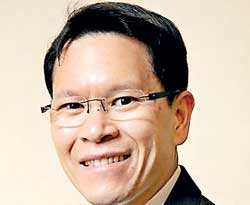Monday Feb 23, 2026
Monday Feb 23, 2026
Wednesday, 8 July 2015 01:08 - - {{hitsCtrl.values.hits}}
BANGKOK (Reuters): Veerathai Santiprabhob, a former International Monetary Fund economist, will soon be Thailand’s youngest central bank governor in more than four decades.
On Tuesday, the Thai cabinet approved the appointment of Veerathai, 45, to succeed Prasarn Trairatvorakul as head of the Bank of Thailand (BOT) for five years, starting 1 October.
Prasarn, who will be 63 in August, was not eligible for a second term because under Thai law, a governor must be under age 60 at the time a term begins.
ANZ called the choice of Veerathai “pragmatic and appropriate”, describing it as “a rare economic smile in what has increasingly become the economic Land of Frowns”.
U.S.-educated Veerathai, a former executive at the Stock Exchange of Thailand (SET) and Siam Commercial Bank Pcl, will have his work cut out for him as he inherits a struggling Thai economy.
A year after a military coup ended months of political unrest that brought the economy to the brink of recession, Thailand’s growth engines of exports and domestic demand continue to sputter.
Faltering exports
Veerathai, who holds a doctorate in economics from Harvard University, faces a country saddled with one of the highest levels of household debts in Southeast Asia and an economy that grew at the slowest pace in three years in 2014.
On 19 June, the central bank cut its 2015 growth forecast to 3.0% from 3.8%, mainly due to faltering exports.
Veerathai, who worked at the Thai finance ministry’s Policy Research Institute during the 1997-98 Asian financial crisis, helped drive Thailand’s capital market development as chief strategy officer at the Thai stock exchange.
He is currently a member of the central bank’s monetary policy committee (MPC) and of the ruling junta’s board that oversees state companies.
A Buddhist and proponent of meditation, Veerathai in 2014 told Krungthep Turakij, a Thai-language business publication he has written columns for, that meditating had improved his decision-making skills.
“I could see my quality of work, thoughts, decision-making process and concentration improve,” he said.
‘One in a million’
Pakorn Peetathawatchai, a friend of Veerathai’s from U.S. studies and an executive vice president of the Stock Exchange of Thailand, said Veerathai’s age would not be an obstacle.
“He is one in a million,” Pakorn said. “He is very sensible and thinks carefully before making a decision.”
Kulit Sombatsiri, secretary of the ruling junta’s board that oversees state companies, said Veerathai “has got the vision”.
Ampon Kittiampon, chairman of the Bank of Thailand’s board, said Veerathai has been chosen as he is “young, capable and suitable in every aspect... his age is not an issue and he is not the first outsider to become the central bank governor.”
In a 10 June column for Krungthep Turakij, Veerathai wrote that economic reform which produces sustainable results “must start with reform in the minds of the people in the society, especially in groups that have received big benefits from developing the Thai economy for the past many decades”.
Thailand will move steadily forward and with balance once the majority of the country see that “economy and mind need to be solved at the same time”, he added.